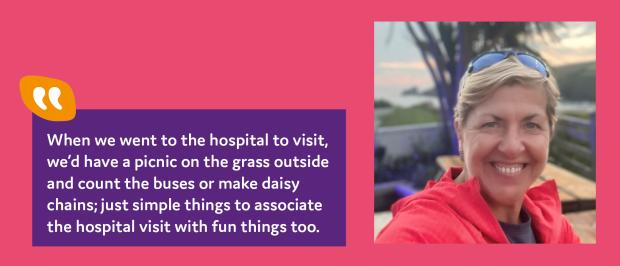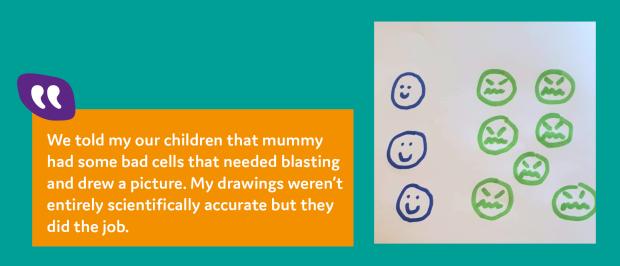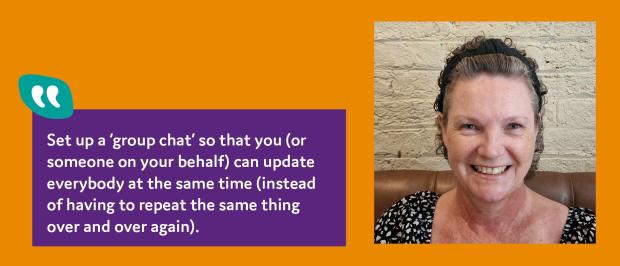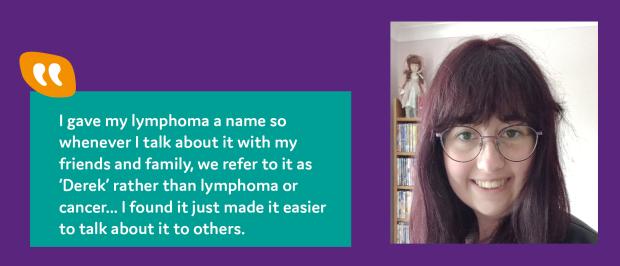Top tips for talking about your lymphoma
Sometimes it can be a challenge to talk about lymphoma, and it can be difficult to start a conversation with other people. This might be the case if you have lymphoma yourself, or if you are a friend, family member or close to someone with lymphoma.
We asked members of our Facebook group for their 'top tips' and suggestions for talking to others about lymphoma. Here is what they told us.

Tips for talking to children and young people

- For our 3-year-old grandson when his dad was in hospital, we used positive language, such as ‘daddy is in hospital getting better’ rather than 'daddy is poorly in hospital'. We also explained that he was having medicine and would be going back in for medicine. The book ‘The Hospital Dog’ was brilliant and my grandson knows it by heart now! When we went to the hospital to visit, we'd have a picnic on the grass outside and count the buses or make daisy chains; just simple things to associate the hospital visit with fun things too.
- We told our children that 'mummy had some bad cells that needed blasting' and drew a picture to explain it. They were 5 and 7 at the time. We explained to them that the medicine also blasted good cells so that was why I'd lose my hair. My drawings weren't entirely scientifically accurate but they did the job!

- We used story books to explain to our children about their cousin with lymphoma. We found this very helpful.
- When explaining to children be as honest as possible. Update them when things happen as this will give them a feeling of control. Reassure them when it’s treatable. Explain any changes that they may see happening, so that they are prepared.
- I gave facts to my 12-year-old in a calm reassuring way. This also helped me feel calm and reassured.
- It's a bit of the process I felt I had control over. We told only the children (late teenagers) when my tests started, and no-one else until we had a firm diagnosis and treatment plan.
Tips for talking to adults

- Be honest and tell them about the journey you are about to go on and how they can help. I wrote a blog, everything from my diagnosis to finishing chemo. It felt like scratching an itch. And writing it down helped me explain it to others.
- Recognise that those with and without lymphoma have different fears, emotions and reactions and so they need different forms of support from one another.
- Tell people that it won't be easy and that you'll need support at times, even if it's just regular messages from family and friends who do not live nearby.
- I told people 'I'm still the same person, there will be adjustments required but don't let lymphoma define what you think of me'.
- I gave my lymphoma a name (I called it Derek) so whenever I talk about it with my friends and family, we refer to it as Derek rather than lymphoma or cancer. It kind of gives a 'face' to it (which also means you can swear at it when it messes up your plans), and I found it just made it easier to talk about it to others. And I just generally tried to stay positive about it.

- Don’t be afraid of silence and don't try to fill it by talking. Silence can be when people are processing, and it's ok to cry.
- Telling people my lymphoma was treatable but not curable stopped people telling me that once treatment finished I could ‘go back to normal’.
- Set up a 'group chat' so that you (or someone on your behalf) can update everybody at the same time (instead of having to repeat the same thing over and over again). It is also handy for providing useful links to reputable sources of information about your treatment, so that they can refer back to it whenever they need to.
- We used a WhatsApp/messenger with friends, and I was able to reconnect with people with whom I had lost contact.
- People find it hard to understand watch and wait (active monitoring). I said it's hard to get your head around, but lymphoma isn't like other cancers and it's better to save treatment for when it's needed as you don't want to use up options too soon for little benefit, although new treatments evolve all the time.
- I found it helpful to be clear about it. For example, explain that it is a blood cancer.
- For really close family who would feel devastated by the news, we made sure we had all the Lymphoma Action materials ready to give to them.
- We let people ask questions and answered with all the Information we were given. We told everyone to stay off Google and pointed them to Lymphoma Action!
- I directed everyone to the Lymphoma Action website because with all the will in the world I got tired of talking about cancer and wanted people to have the best information.
- When people ask about my treatment I'm careful to say that although chemo does work for most people it didn’t quite make the mark for me, and I had to have a very special kind of treatment - like a stem cell transplant but where my cells were genetically modified (aka CAR-T cell therapy). I say I am now in remission (my consultant's words), but I never say it's cured or gone. I am now living my life to the full!
- When it feels like you have a mountain to climb and it all just feels impossible, overwhelming and never ending, focus on achieving just 1% improvement in some way and in 100 days… you’re 100% there!
Read our information about relationships, family and friends
We have more information about communicating with other people.
This information comes from our Facebook users and online support meeting members, and is a list of suggestions from the community based on what they personally found useful and what they would like to pass on to others. This is not intended to be medical advice and is not a replacement for advice from your medical team. If you are looking for specific guidance for your own personal circumstances always consult your medical team.
